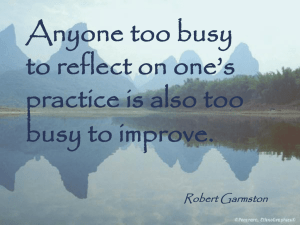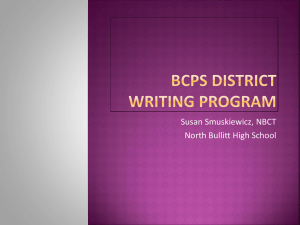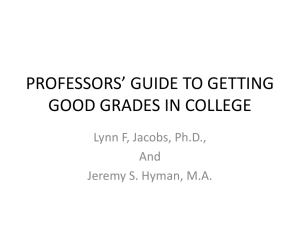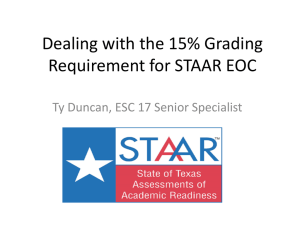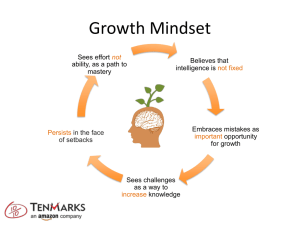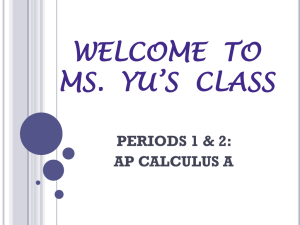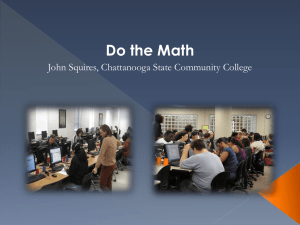VT Grading Presentation 1 & 2
advertisement
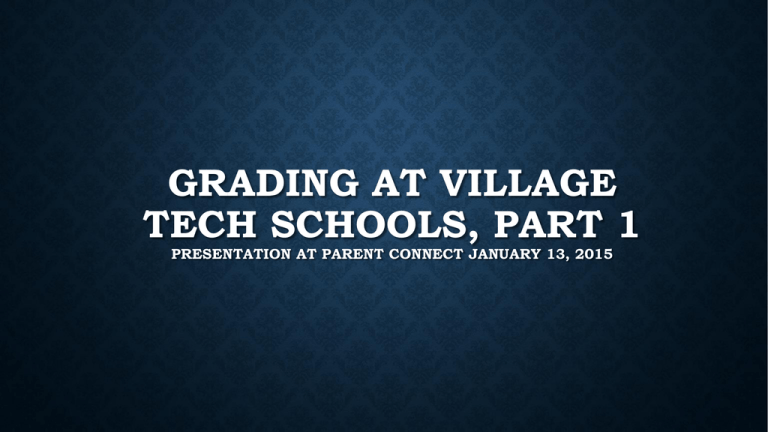
GRADING AT VILLAGE TECH SCHOOLS, PART 1 PRESENTATION AT PARENT CONNECT JANUARY 13, 2015 WHAT IS SUPPOSED TO BE THE FUNCTION OF TRADITIONAL GRADING • Communicating Performance • Providing Motivation through feedback to students and parents • Criteria for guidance • Data for future planning TRADITIONAL GRADING CAN BE MISLEADING • Not a reliable indicator, mislead parents into believing that their child is making progress toward college and career readiness. • Allows advancement without mastering skills. Homework situation – A Mother and her son. They were working on Algebra I homework, it was late, they were tired, they get to the last question – a good, multiple steps, higher level thinking problem. The kind of Advanced Level III question students will see on the STAAR.“ In her conversation to her son about the last problem late at night, her son says, “Mom, it's ok. I can take a miss on this question and still get a 95 on my homework.“ This is an example of what traditional grading can do. • Not a motivator. • Mostly used to differentiate and rank students. REDESIGNED GRADING • Provides honest feedback toward the skills and/ or content learned. The TEKS (required by the state to be taught) provide levels of competency through the verb. An example: if the content of a subject is on resources and the action of the TEKS ‘to know the content’ is at a level of action on the Bloom’s Taxonomy of compare (compare the natural resources of Honduras to that of Egypt), the student should be able to communicate to an audience the resources of both countries with a creative display in a comparative style. • Shows how to improve. WHAT IS PROFICIENCY- BASED, PERFORMANCE-BASED, STANDARDS-BASED, OR MASTERY-BASED EDUCATION? • Students advance upon mastery. • Competencies include explicit, measurable, objectives. • Assessments are meaningful. • Students receive differentiated support based on their learning needs. • Learning outcomes include the application of knowledge and development of skills. HOW TO GET TO A MASTERY-BASED GRADING SYSTEM • Develop the understanding of the levels of knowledge for the meaning of what proficiency means. A Mastery-Based System is based on the action in which the student demonstrates the content or skill learned. The action is found in the verb of the TEKS or the rubric. • Below Proficient means the student did not meet the action with the content or skill. Proficient means the student is beginning to meet the action with the content or skill. • Mastery means the student met the action of the content or skill. • Exceeds Mastery means the student demonstrated higher in the action, according to Bloom’s taxonomy or the rubric, than the TEK or rubric required at mastery levels. NEXT TWO SLIDES ARE BLOOM’S TAXONOMY • 1st Column – Level of thinking skills. • 2nd Column – Definition • 3rd Column – Teacher role to help develop the level of thinking skills • 4th Column – Student actions to meet thinking skill level • 5th Column – Verbs that would lead the students to that level of thinking skill. • 6th Column – Ways that the student might show the level of thinking skill. HOW TO GET TO A MASTERY-BASED GRADING SYSTEM • Create a school-wide standards-based grading policy. Students pass when they are proficient or above on the performance standard for the content. • Separate behavior from academic progress. • Feedback to keep the excellence and progress positive. • Grading is based on progression as opposed to finalization (we are finished with that, let’s go on to the next lesson). HOW TO GET TO A MASTERY-BASED GRADING SYSTEM • Communicate where students are in their learning progression. • How does VT communicate to the students/ parents where their student is in the learning process?: • Vt •% Vs. • Em(Formative) • Soft Skills • Narrative • Portfolio (EOL, POL) Traditional % ø ? ? ? HOW TO GET TO A MASTERY-BASED GRADING SYSTEM •Shared vision of what students should learn. For VT, this comes in the form of TEKS-based curriculum, social/ emotional skills training, and presentations. HOW TO GET TO A MASTERY-BASED GRADING SYSTEM • What are some of the ways to measure student performance?: • GPA/ Rank Soft Skills on the report card • Communication Mastery Based on the report card • Narrative on the report card Rubrics • Portfolios POL/ EOL • Summative/ Numerical on the report card • Leadership Notebooks - Wigs or goals, Data Tracking, Roles, Victories, Student Led Conferences, Action Planning, Challenges HOW TO GET TO A MASTERY-BASED GRADING SYSTEM • How do students know their level of performance? Students • 1..Rubrics, Mastery (LP P M EM) Academic/ Technical • 2. Skills (soft) (Struggling, striving, thriving) Professional and/ or social emotional • 3. POL/ EOL • 4. Student Led Conference Teachers - Summative and Narratives - Report Card Students and Teachers - Portfolios - year after year. HOW TO GET TO A MASTERY-BASED GRADING SYSTEM • Time Line 1st Nine Weeks - Progress Report and Report Card, 2nd Nine Weeks - Progress Report, Report Card, Presentation of Learning, 3rd Nine Weeks - Progress Report and Report Card, 4th Nine Weeks - Progress Report and Report Card, Exhibition of Learning, Portfolio, State Assessment Result. The Leadership Notebook is ongoing for the year. VT HIGH SCHOOL’S ADDED GRADING COMPONENT – SUMMATIVE SCORES • State works with numeric grading only. Submissions to the state are in numeric form. • High School has to have at this point a numeric grading system to report scores to the state. • Village Tech added a Summative component to the report card to accommodate the state’s required submission expectation, show the finalization of learning at points of time and meet the need of the student who has a goal of an academic emphasis with college plans. VILLAGE TECH REPORT CARD ELEMENTARY AND MIDDLE SCHOOL • Elementary/ Middle School (Grades Prek-8th Grade): Mastery-based Limited Proficiency LP – failing Proficient P – passing but very low in expectations Mastery M – Meets the TEKS (Verb/ Bloom’s Taxonomy), or rubric expectation. • Exceeds Mastery EM – Exceeds the TEKS (Verb/ Bloom’s Taxonomy) or rubric expectation. • The Mastery Grade may receive a no-credit grade of incomplete IN, work in progress IP, or no work shown NWS if the TEKS is not ready to show at least an LP. • Students can work on improving skill and/ or content the whole year. These grades do not need a semester submission for credit. • • • • VILLAGE TECH REPORT CARD ELEMENTARY AND MIDDLE SCHOOL • Soft Skills Grading – Will be included in the report card when we cross over to new company. The Soft Skills grading (Based on Covey’s Seven Habits found in the Leader In Me) will be a local grade for VT only. It will not be passed to the state at any level for a state required grade or included in the semester average or GPA. HIGH SCHOOL GRADING •Report Card will contain Mastery Grading of the TEKS and rubrics as well as Summative Testing scores. MASTERY GRADING HIGH SCHOOL • Mastery Grading for the high school is the same as the Elementary/ Middle School grading in Expectations. It is based on the TEKS or Rubric. A semester submission is required for credit. • The Mastery Grading will count in the overall semester average. • With an academic class the grading will be 50% Mastery and 50% Summative. • With a PreAP class the grading will be 40% Mastery and 60% Summative. • With an AP or Dual Credit class the grading will be 30% Mastery and 70% Summative. MASTERY GRADING HIGH SCHOOL • The conversions from alpha to numeric of the Mastery Grading: LP = 65 P- = 73 M- = 83 EM- = 93 P = 76 M = 86 EM = 96 P+ = 79 M+ = 89 EM+ = 100 The student will receive a LP, P, M, EM according to the TEKS and or Rubric and will be given a -, natural, or + according to the excellence presented. The Mastery Grade may receive a no-credit grade of incomplete IN, work in progress IP, or no work shown NWS if the TEKS is not ready to show at least an LP. A student may raise the grade by the semester’s end. SUMMATIVE GRADING HIGH SCHOOL • Summative grading will be included in every subject (not just the course) except for Pass/ Fail courses such as PE. • At least 4 Summative Grades will be taken per subject per nine weeks period. • The Summative Grades will be averaged, along with the Mastery Grades, for the semester average as recorded in the above slide. • The Summative Grade may be raised upon teacher approval by the time indicated but not after the semester’s end. • A student may receive an Incomplete for up to two weeks after a semester’s end. CREDIT FOR CLASSES IN ELEMENTARY AND MIDDLE SCHOOL • The state has a system of credit based on the time in school for these students. Any transfers in or out will received the grades based on the time of enrollment in that school of attendance during the school year. A student may receive credit for their classes in one school if they are enrolled the entire year in that one school or may receive grades from two or more schools if they were enrolled in two or more schools during a school year. EIGHTH GRADE HIGH SCHOOL CLASSES • Students who complete successfully the Algebra I and English I courses will receive credit on their transcripts for those two classes. Any other high school course offered and successful completed will be included on the transcript as well. • These courses will not be used to calculate the GPA on the high school report card. HIGH SCHOOL CREDIT FOR COURSES • A student will receive credit for a high school course per semester that they have completed successful with a 70% average. • Paired high school courses will not be recorded individually but as a course as a whole even though the state requires individual records. The transcript will indicate the individual courses completed. HIGH SCHOOL HONORS/ ACCOLADES • The Valedictorian and Salutatorian will be honored in graduation. They are awarded based on Grade Point Average. • Must be in high school all four years to be considered. • May be more than one offered in a category depending on the GPA. HIGH SCHOOL RANKING • Based on GPA • Weights for classes that are considered in the GPA are: • Academic class – not weighted • PreAP – 4 points • AP and Dual Credit 8 points • Weighted points will be given per subject that meets the criteria above. When the course is paired with another subject, each subject that meets the criteria above will be given the points in that course. THANK YOU FOR BEING HERE TONIGHT! GRADING AT VILLAGE TECH SCHOOLS, PART 2 PRESENTATION JANUARY 27, 2015 GRADING AT VILLAGE TECH SCHOOLS 2014-2015 PART II Questions and Answers • Need to see a user friendly report card. One that will automatically calculate GPA and standing. High school report card should read more like a high school report card. • The report card we are using today is made by Village Tech. The transition from one company to the other will culminate in August 2015. The look will be standard and be available online. • Will X Classes carry weight? • No, they are interest classes and attendance is taken. Some classes might compliment the academic subjects and influence the grade like that. • Is VT Grading system weighted differently than 4.0? No • Will there be class ranking? Yes • Is the 9 week periods different than the 6 week periods? • There is not a lot of differences in the 6 to 9 week grading periods. When receiving summative grades continually the 6 weeks is adequate to produce an outcome. In our Mastery Grading, the rubrics, lessons, and activities receive more time to record per period. Mastery takes time and failure. Iterations grow from that process and produces excellence. The 9 week periods are meant to keep that flow from lesson to lesson more fluid. • How do you average grades with less homework assignments, not including tests and quizzes? • The rubrics are meant to give a good look at how to proceed with mastery. The average is taken from the last evidence of where the student is on mastering the TEKS. In PreK through 8th Grade, the student has all year to bring scores up if they continue to work on the TEKS. In high school, students will have one semester to continue to bring scores up if they continue to work on the TEKS. Summative grades in high school are given and those scores can be raised up until the end of the semester as teacher allows. • How can you give a grade to a student when they haven’t mastered a content because it wasn’t taught to them before in previous years? • You are correct, it is not really fair. The supporting TEKS should have been covered. But, with traditional grading a teacher covers the content and then gives a grade. Many students could be left out of the mastery of that/ those TEKS because the time limit has passed and it is time to go on to the new TEKS. Or, the student is not getting what is taught. Village Tech has to cover the grade level TEKS and work with students on catching up if they need the help. An honest, good effort by the student will be recorded. With mastery grading, the student may continue to work on that TEKS to raise the score. If the class has just started new TEKS in the last grading period, the teacher may not show a grade or the TEKS on the report card. In Progress will be shown in those moments. • How do you grade Special Education students on their performance? • The modifications, if any, will be ageed upon in the ARD Committee Meeting and the parent will see the accommodations or modifications. The grade level TEKS are required to be taught to all students. • I would like to be able to see a system implemented where I can look up what assignments are scheduled to be due. • We want you to see that also. Right now we rely on the teachers to communicate, students to show you their rubrics, and students to show their leadership notebooks. • Some teachers do not have rubrics. How do we know what is being graded? How can we check on their homework and progress? • The preparation for class will produce materials to use. That should be in line with the rubrics. Communication with the students and teachers will help with this also. I anticipate VT using an online system for communicating information to parents. That will come in the Fall of 2015. • Pre AP, AP students should be separated. It is only fair. They are doing the same work and getting more points. • The integration of students in not uncommon. There are more expectations involved for the higher challenging courses. Teachers are trained to teach the courses in the PreAP and AP format. Since the work is more challenging than the regular academic class, more points are awarded. • There are no EM-, EM + on the report cards. Do we know what students receive? • Yes. The plus and minus will appear on the report card starting this semester. The system did not start until now because we programmed it to appear. This is one of the reasons we are transitioning to a new system this Fall. This last semester the high school received the highest grade possible in the transcribing the mastery grade to the numeric grade. This semester the plus, minus will be implemented in high school grading. • Will the grading system filter on down to all lower grades? Will previous grades be updated to reflect this? • I might be missing something here but let me see if I can answer the questions from my perspective. The grading system is in place for PreK8th Grade. – LP, P, M, EM. We will continue to use the mastery grading for those grade levels. I do not see changes coming about for them. The high school has created some changes. Village Tech will meet the state requirements for grading. • Will the grades be easily recognized and evaluated by colleges? Other public school systems? • Yes the grades will be recognized by colleges. Other public school systems already take our grades. We have to transcribe them to numeric, but it has been accepted by several schools. • Why is there no homework? • Could be a grading question. Students work during the day. If they do not complete work they may take it home. If they are behind in a subject, homework may be given. VT believes the home is a place for family and their time together. Homework impedes that interaction. Upper level courses usually have homework because of the increased instructional/ learning demand. • Do you expect the grading method to change over the course of three years? • Yes, I do. The public school system is slowly seeing the value of mastery grading. It is most popular in the northern states where colleges are receiving the master grading without a numeric transcription. I bet you were talking about VT though. I do not see much need to go beyond the framework provided. The “what if’s” might direct some clarification. • Grades seem subjective. • The mastery grading inserts more objectivity in the grading systems. Measuring the scores based on student skill based on the verb of the TEKS give more stability in the results. • Grades do not match test scores. • They should. The only variances should be test anxiety or lack of work/ interest/ effort. • Is an LP brought up by mastery? • Yes. Since it is mastery based, the score can only be brought up by the student and their efforts in reaching the high levels of the rubric or the verb of the TEKS. • How does the LP, P, M, EM coincide with the summative grades given? • Good question. The mastery grading is the only system measured in the PreK-8th Grade. The mastery grading and summative grading are used together in the high school grading system. Both systems have their place in the grading. Mastery grading is what we are about. For those students seeking an academic emphasis, the summative grading is in place. The more academic minded the student, the more weight given toward the summative grading. The experience of both mastery and summative gives a good look at the real world experience. Some products or services can be improved (mastery) while others will be measured for what the employee can do (summative). In the sense of numeric grading: • LP = Failing (65) - F • P = Passing 70 to 79 – C • M = Passing 80 to 89 – B • EM = Passing 90 to 100 - A • What is the purpose/ meaning behind selecting Valedictorian/ Salutatorian with criteria being the student(s) must have been here all 4 years? • In a competitive sense, students transfer the last years of high school to secure an accolade such as one of these. If we honor a student, we want the integrity of our systems to reflect a student who has journeyed with us through our school. It is a well deserved honor and I believe it is more special because it has been awarded to a truly VT student as opposed to someone looking for a quick honor. High school is the only place where the scores begin to count toward these honors. • Will the grading system be acknowledged by colleges? • Yes. Colleges in the north have started to accept the mastery grading without transcribing to a numeric system. Texas does not currently do that. That is why we have built in the numeric component that the state requires. We tried to keep true to our original intent of mastery grading, even when adding the summative component for the high school. Remember SAT, ACT, Accuplacer tests, and transcripts are used for admission into colleges. They will look for civic activities as well as the academic. • Will the students fill out reviews of the teachers, particularly in high school? This could provide good feedback and framework for students to learn/ participate in class. • I think this is a good idea. As we turn our attention from grading and high school, you will see more involvement in creating and developing increasingly effective teachers. Feedback is a good tool. Having students involved in the process is a great idea and the founders have expressed interest in this area. We used this experience in hiring some teachers. The insights from students were eye opening. We plan on involving students and parents more in the evaluative side of VT. HB 5 TEXAS FOUNDATIONAL HIGH SCHOOL PROGRAM RECOMMENDED HIGH SCHOOL PROGRAM DISTINGUISHED HIGH SCHOOL PROGRAM POSSIBLE CHANGE TO 8TH GRADE IN THE FUTURE • 8th Grade (4) English I (1) Algebra I (1) Spanish I (1) Principals of Information Technology (.5) Principals of Arts/AV (.5) Thank you for coming tonight! Have a great rest of the evening.

